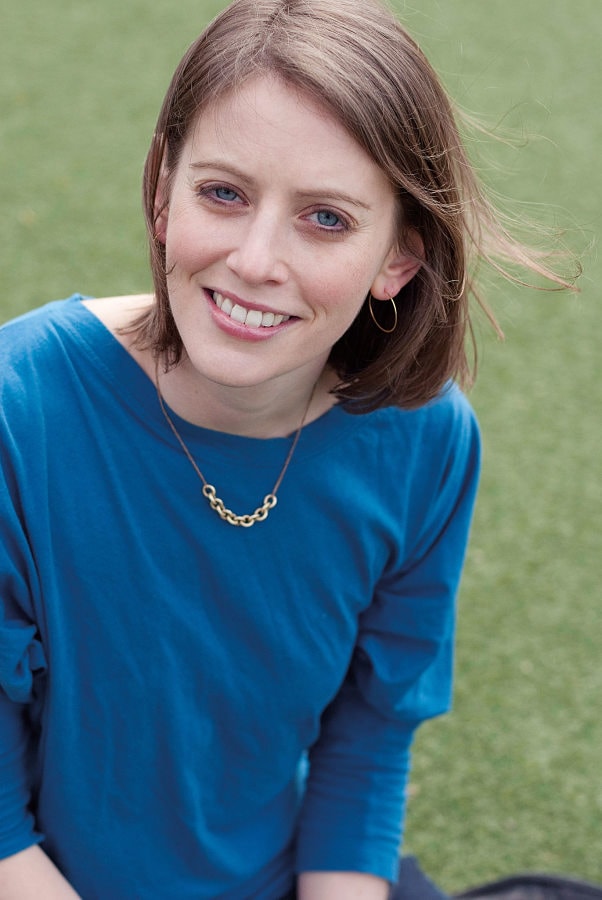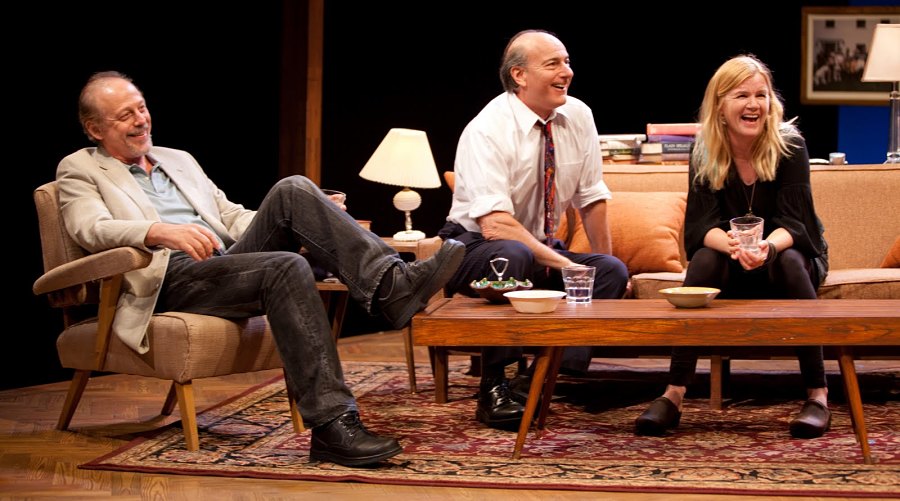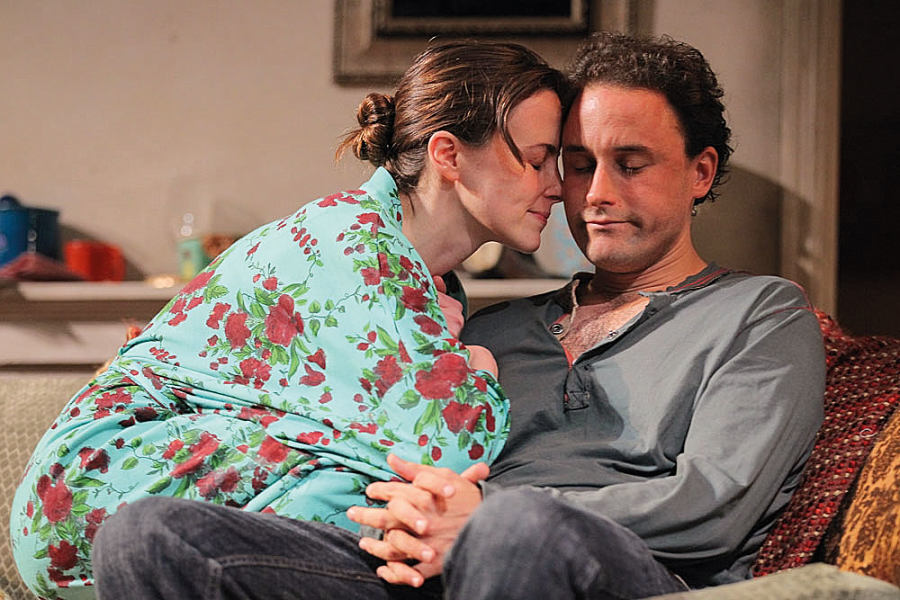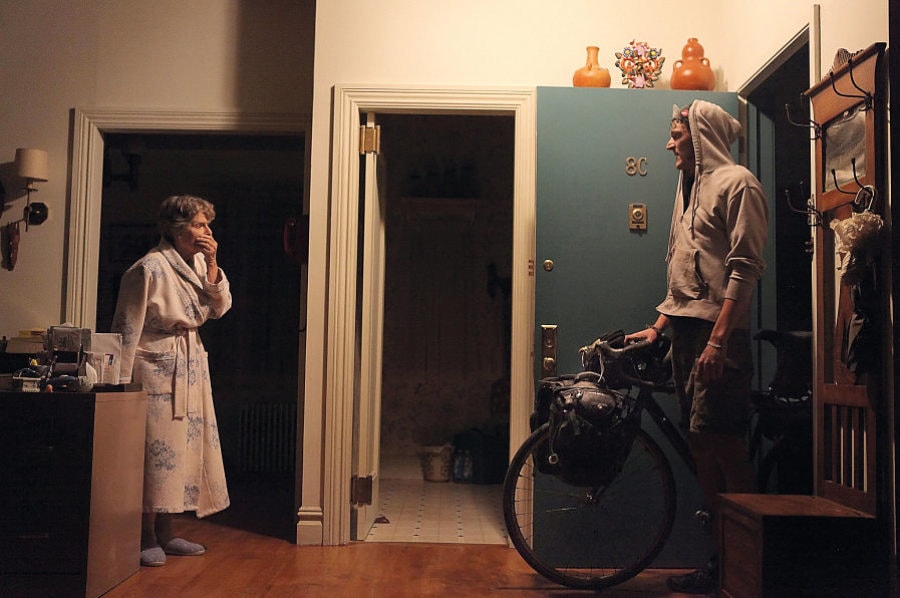On a squally December day, playwright Amy Herzog curls around a mug of hot chocolate. She is small, fine-boned and still slender even in the fourth month of pregnancy. Her burgundy blouse sets off the paleness of her skin, eyes and bobbed hair. Her driver’s license proclaims her age as 33, yet from certain angles she appears a decade younger.
But don’t let the little-girl looks fool you. Herzog’s writing is unstintingly mature. Her plays assiduously balance autobiography and fiction; personal interests and political ones; concealment and exposure. Several critics of her second produced play, 4000 Miles—which was directed by Daniel Aukin on Lincoln Center Theater of New York’s LCT3 stage last summer, and will be remounted in its mainstage season March 15–May 20—called her writing “delicate.” Herzog doesn’t dispute the description, although, she ventures, “I hope they would add ‘and occasionally ferocious.’” (Readers of American Theatre can judge for themselves: the full text of 4000 Miles will be published in the upcoming April issue.)

Herzog, who turned to playwriting after having trained as an actor, first appeared on theatregoers’ itineraries in 2010, when Carolyn Cantor directed After the Revolution, first at the Williamstown Theatre Festival in Massachusetts and then at New York City’s Playwrights Horizons. The play concerns the Joseph family, a multigenerational enclave of communists, socialists and firebrands whose youngest member, Emma, is dismayed when she discovers that her blacklisted grandfather spied for the Soviets. (A similar disclosure threatened Herzog’s own family.) She followed up with 4000 Miles, which borrows one of Revolution’s characters—feisty nonagenarian Vera (based on Herzog’s own outspoken grandmother)—and thrusts her into conflict with her 21-year-old hippie grandson.
Toward the close of After the Revolution, Miguel, Emma’s boyfriend, gently suggests, “I think it’s about time you put some distance between yourself and your family.” In her next two plays, Belleville and The Great God Pan, Herzog seems to be taking her character’s advice (though the first was apparently begun before After the Revolution). Yet each of these works still borrows aspects of Herzog’s own life: For instance, Belleville’s Abby echoes Herzog herself when she explains why she left acting: “To be an actor you have to love to suffer, and I only like to suffer.”
The taut Belleville, directed by Anne Kauffman in November at Connecticut’s Yale Repertory Theatre, observes an expatriate couple alternately cleaving together and breaking apart in a marginal Parisian neighborhood. The Great God Pan, which reunites Herzog with director Cantor and will be mounted at Playwrights Horizons later this year, concerns a young man who must reevaluate his past and present when he becomes aware of a long-ago, unremembered trauma.
Jim Nicola, who will produce Belleville at New York Theatre Workshop in 2013, believes the distinction of Herzog’s work is her belief “that private, individual experience is always inseparable from public, historical processes, when she explores human lives.”
Tim Sanford, artistic director of Playwrights Horizons and one of the first to champion Herzog, speaks to her willingness to take on “ideas and history, which not everyone believes in anymore.” He also praises the sophistication of her structures and characters. “You can see the affinity for Richard Nelson, who was her teacher,” Sanford points out, referring to the veteran playwright and teacher at Yale School of Drama.
Nelson, however, denies he had much impact on her writing. “She has great, great facility for dialogue,” the playwright notes. “It’s clean, it’s simple, it’s evocative, it’s witty. It’s alive and easily spoken. Very, very actable. That’s a given talent.” John Guare, another of her Yale instructors, claims, “Amy came fully formed.” He compliments her “warm-hearted, cold-eyed sympathy for her characters.”
The directors she has worked with also note that same strange mix of kindness and dispassion. Kauffman recounted how just before Belleville’s previews began, Herzog decided to jettison an ending that hadn’t worked and substitute another. “I was completely blown away by Amy’s bravery and willingness to throw away what seemed to me to be a touchstone for her,” said Kauffman. “But she was right.” Cantor describes Herzog as a “master rewriter, sensitive enough to discern the weak moments in the play, clear-headed enough to alter them.”
Like many playwrights, Herzog finds herself lured toward Hollywood. She’s completing a romantic comedy screenplay for Castle Rock Entertainment and has other film and TV projects in early stages of development. Yet she anticipates a long career in the theatre, and likely a varied one. “I’m trying to find really different modes of writing plays,” she says.
But there are similarities among her plays, too, ones not limited to her sure feel for structure and her depth of characterization. In all of Herzog’s plays, revelations both minor and major force characters and audiences to reconsider all they’ve seen and heard. Inevitably, the people in her plays must accept how little they know themselves, how little they know each other. Each of her scripts—from the political fireworks of After the Revolution to the melancholy comedy of 4000 Miles to the hushed menace of Belleville to the rueful tragedy of The Great God Pan—is something of a mystery. But only in the sense that any human heart remains the most mysterious, unknowable organ of all.
ALEXIS SOLOSKI: We were Yale undergrads at the same time, but I never knew you were a playwright.
AMY HERZOG: Neither did I!
I only knew you as an actor. You were a wonderful Thomasina in Tom Stoppard’s Arcadia. When did you discover playwriting?
I began writing plays the year after graduation. I was cast in a Theatreworks USA tour of Ramona Quimby, an adaptation by Len Jenkin. I went on tour for six months, although I only lasted five. I was Beezus, the older sister, and I was utterly miserable. I guess that was my transition out of acting, though I didn’t know it at the time. Also, I had founded a company with other people from my class at Yale. We decided to put together an evening of 10-minute plays.
So I wrote this 10-minute play, which was totally dreadful, but I thought it was really good at the time. It was called Granted and it was about a young woman who had recently had a psychotic break. That was in the spring of 2001. The following fall I started taking a playwriting class at Columbia. Mostly because I missed being in school so much. I felt unmoored and wanted a teacher.
So you hadn’t taken any playwriting previously?
Nothing in high school. Nothing in college. I always thought of myself as a writer, but not because I was actually writing.
That’s remarkable that you’d only been writing for two years before you were accepted to Yale Drama.
Yes, and I was accepted on the basis of this horrible play that I hope no one ever sees—it’s called In Translation. It was about a 19-year-old Kafka scholar and her relationship with her professor. And of course it alternated between 2001 in New York, with these people studying Kafka in the wake of September 11, and 1910 in Prague, where you met Kafka’s family and saw randomly chosen scenes from his life.
It doesn’t sound like your writing at all.
It was very cerebral and forced. It’s still my mother’s favorite play.
Tell me something about your time at Yale Drama, the teachers you studied with and the plays you wrote.
My first year I wrote a play called Willing, which also had this fabulous, Arcadia-like structure, alternating between this young female art historian studying a conceptual artist and the artist himself, back when he was alive. It’s another one that I hope never sees the light of day. My second year, I wrote Hungry, about three teenage girls in New Jersey, which I think was breakthrough-ish for me. It was just three people on stage dealing with each other, and it had none of these weird structural conceits. Richard Nelson was running the program, and that year we also studied with John Guare, who is an incredibly passionate teacher. Sometimes he would savagely tear into us.
Really?
He has this way of teaching where the underlying sense is that what you do is sacred, and if you’re not fundamentally respecting the craft then what you bring in is an abomination. The flip side was how much he cared about the work when he thought it was good. I remember at the end of one class I went to drop some of my pages into the recycling bin and John impulsively grabbed them from me and kissed them before letting them drop. I also loved studying with Lynn Nottage. She taught this brutal class on comedy. The way that she had us go to this very earnest place before finding the comedy is something that I still think about. In the third year, I wrote a play called The Wendy Play that had a cast of 16. That was the year we had Lisa Kron for solo performance and Michael John LaChiusa for writing lyrics.
The Wendy Play is set in a summer camp?
It was based on an experience I’d had teaching at a creative arts summer camp where I came up against a conservative leadership. They’d asked me to write a play, which they found really racy and offensive in ways that totally shocked me, and I got into a struggle with them.
Do you want that to stay in the drawer, too?
Yes. I never figured out the successful counterpoint between the play within the play and the play itself.
Why do you say of so many of your early plays that you hope they’re never produced?
Maybe it’s silly of me to say that, but I think it’s natural to react strongly against your earlier work as part of the process of becoming a better writer.
Well, I’d like to see The Wendy Play. Richard Nelson mentioned it as a favorite. Actually I spoke to both John Guare and Richard Nelson, both of whom suggested that you arrived in their classes with your voice fully formed. Nelson also suggested that dialogue comes very easily to you, very naturally. Is that true?
Well, writing dialogue has always felt like a very natural form for me. But I don’t think that any of my plays before After the Revolution works, and I wrote that when I was 30. And at the moment when I encountered those teachers, my voice was a lot more forced and brittle. There was some process of relaxation that hadn’t happened yet.
You had a spate of early works that were heavily autobiographical: The Wendy Play, which you mentioned, and Love Song for Two Voices, a solo piece about yourself and your mother, which you performed. It’s very revelatory. Was it difficult to write?
It was an assignment in Lisa Kron’s class. I don’t know that I would have written it otherwise. When I finally performed it in New York for people I knew, I felt very depressed and vulnerable about it. I don’t think I’d want to perform it again.
How did you prepare your mother for it?
I let her read it, and that went well. And we talked about it. We had an amazing conversation.
I think it must have been very painful for her. Your character is so unhappy throughout most of that play. She talks about her eating disorders, the dissolution of a romantic relationship. It must have been hard for her to know how unhappy you had been.
I think she did know. But, yes, she had to confront those things in a very direct way. She came almost every time I performed it and she would always weep. But what she kept saying is that she was proud of me. A very generous reaction.

Perhaps because of that generous reaction, you kept writing about your family, moving on in After the Revolution and 4000 Miles to grandparents and cousins and uncles. Was that a natural progression?
Well, in Love Song, the addition of my mother’s voice came late, but was by far my favorite part of the final project. So I was learning a lesson there about my life being maybe less interesting than I had been convinced it was, and I was becoming more interested in the people around me.
Your paternal grandmother, Leepee, shows up for a paragraph in Love Song, then again as Vera in After the Revolution and in 4000 Miles. How does the actual woman differ from your stage portrayal?
Of all of my stage portrayals, she differs the least in reality. She’s a fascinating and difficult and wonderful woman. I lived with her for six months after I graduated college. We had always had a close relationship, but we had never tested it by living in close proximity. We had a very hard time, and it wasn’t clear the relationship would survive.
She’s now 95 and still in the same Village apartment. Does she enjoy appearing in your plays?
After she saw After the Revolution she made a lot of nasty wisecracks, which were classic and amazing, like, “You’re really creative, but fundamentally you’re a conservative.” With 4000 Miles I was terrified because it’s so much about her aging and losing her faculties—dying, in a way. But she read it three times in advance—because she can’t hear that well—and she came and she loved it, and has surprised me by not being tougher on me about it.
Daniel Aukin mentioned that after the first performance she came and gave you notes.
She thought everyone was too quiet.
Your next two plays, Belleville and The Great God Pan, seem to depart from your own experience and that of your family. Was that a conscious choice?
I don’t remember making that decision. I started writing Belleville before After the Revolution. It was a tortured writing process and I threw out two first drafts. And The Great God Pan I wrote quickly when I really couldn’t face Belleville.
And yet even in these plays that are clearly not autobiographical, you do keep borrowing from your own life. Abby in Belleville has also gone to Yale and studied acting. Paige in The Great God Pan has a history of eating disorders. Is it convenient to draw on actual events, or do you try deliberately to insert real-life, authentic events in a script?
Anything I write has a lot of points of contact with my own experience. I’m not sure I’ve ever thought of it as either convenient or deliberate. I’ve never looked at a play I’ve written and thought: This lacks authenticity, I’d better insert something from my own experience. With Abby—it’s funny—I used to act and I also do yoga, but I think of her as based on other people. Yet, of course, it has to do with my own failure to be an actor.
I think that one of the reasons After the Revolution garnered attention was because it was a forthrightly political play by a young woman. And there aren’t many of those.
Are there more forthrightly political plays by young men?
Good point. Did you set out to write a political play, a play in which people have complicated, involved discussions about politics?
I knew that those qualities would be true of it. But because I had witnessed these events in my family, I know how emotional it was for the people concerned. That was as interesting to me as the debate contained within it.

In 4000 Miles, the politics are less overt, and in Belleville they’re even more veiled. And I’m not certain The Great God Pan has a political dimension at all.
That was probably about me needing a rest from a certain kind of play. I don’t rule out the possibility that I’ll write another explicitly political play at some point. But after writing After the Revolution and struggling with managing that much plot and those cerebral conversations, all contained within an emotionally motivated story, I think those muscles were tired.
All the directors you’ve had—Carolyn Cantor, Daniel Aukin, Anne Kauffman—work on new plays and they mostly work in realistic modes. What differences did you find among them?
They’re all wildly different. Daniel is the quietest. His style is to let the actors do the scene four or five times without giving them a single note. His approach is very gentle and quiet and focused. Annie’s rehearsal room is loquacious and bubbly, there’s a lot of talking and a lot of verbal engagement around the work and a very high energy level. She’s very detail-oriented. Carolyn is somewhere between the two. One of her brilliant strengths is casting and she is a true actors’ director.
Your husband, Sam Gold, is also an excellent director of new plays, but he hasn’t yet directed any of yours. Was it a conscious choice not to work together?
Yes, it continues to be a conscious decision on both of our parts. Our marriage and our careers are going well. So why risk it? Also, I have three directors I love working with, so that’s an embarrassment of riches, and it’s stressful even now to think when I write my next play which one of them will have it. If I felt no one understood my work, I’m sure I’d be more willing to take the risk.
Both of you have already met with remarkable success. And you’re only 33. Is that great or is it anxiety-provoking?
It’s great. It would be silly to say it wasn’t great. It is anxiety-provoking, but I had a lot of years when no one was doing my plays and that was really anxiety-provoking.
But there were only three years between graduation and your first success….
It felt long! And I was in a lot of debt and working jobs I hated. My anxiety levels were higher than they are now. It’s a wonderful luxury to be in the position I’m in.
Alexis Soloski is a lecturer in Columbia College’s Core Curriculum. She is a drama critic for the Village Voice and she appears frequently in the New York Times, the Guardian and on BBC Radio.


